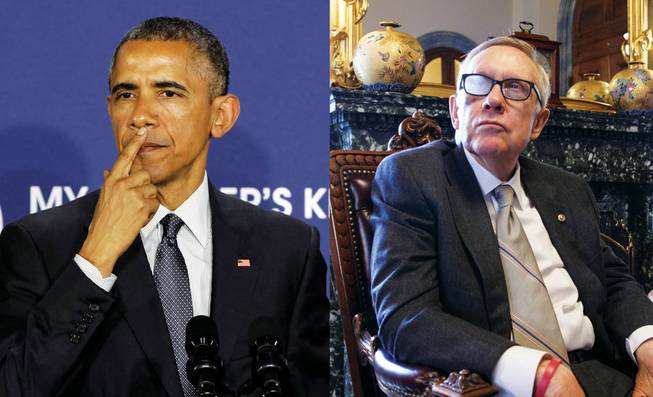
AP Photo
Monday, May 11, 2015 | 2 a.m.
WASHINGTON — One of President Barack Obama’s closest allies in Congress is Sen. Harry Reid. As head of the Senate for two-thirds of Obama’s term, Reid has gone to bat for the president on numerous issues, including immigration and the Affordable Care Act.
But there’s one issue driving a wedge between the two Democratic leaders: free trade. It’s a rare fight Reid could lose. Obama is trying to work around Reid to get two trade deals approved by Congress, one with 12 Asian-Pacific countries and another with Europe. Reid opposes both.
“I have never, ever, in my 33 years in Congress, supported a trade agreement, and I’m not going to start now,” Reid said last month. “It puts us at a disadvantage. So the answer is not only no, but hell no.” It’s likely, however, the deal will progress despite Reid’s objections.
Why Obama is for free trade
The Democratic Party is divided about whether free trade is a good idea. Obama is among the smaller camp of Democrats who see loosening trade restrictions as a way to increase foreign investment in the United States.
“They are wrong,” Obama said of trade opponents such as Reid.
Proponents say trade can grow countries’ GDP, which in turn can boost workers’ wages and increase discretionary income, which could benefit tourism and cities such as Las Vegas.
Why Reid is against free trade
Reid believes free trade is bad for American workers. Nevada has a heavy labor union presence, and unions are some of the most vociferous opponents of trade deals. Groups such as the Culinary Union and AFL-CIO fear that loosening global restrictions on imports and exports will entice companies to move plants overseas, where labor can be cheaper.
“You can’t keep allowing these jobs to be shipped to countries you could never compete with,” said Danny Thompson, executive secretary of the AFL-CIO in Nevada. Las Vegas’ service-driven economy hasn’t been hit particularly hard by past trade deals. But smaller manufacturers in Nevada have been affected, Thompson said.
Another downside: Trade deals often are negotiated at the executive level without the input of Congress or special interests. Members of Congress get only an up-or-down vote.
Why Reid could lose the fight
It’s not just the president who hopes to sign a deal. Most mainstream Republicans stand with Obama on the issue. And since both chambers of Congress are controlled by Republicans, there’s an easy path to push through the free trade deals.
Senate Majority Leader Mitch McConnell has said it’s a priority for him to bring up a bill that would allow Congress to vote on the Trans-Pacific Partnership trade deal. In eight years running the Senate, Reid never said the same, despite knowing it was a priority for Obama.
Who is right?
Depends on how you look at it.
Most economists say free trade is an efficient way to grow the economy. Allowing goods and services to flow more freely across borders helps countries to specialize in just a few goods and services. If Japan makes cars really well, for example, the United States can buy Japanese cars and focus instead on high-tech industries.
But that means some industries in each country will suffer. Free trade opponents point to a 1990s pact signed by President Bill Clinton. They say the North American Free Trade Agreement, or NAFTA, caused manufacturing jobs in America to move to Mexico. Free trade supporters say manufacturing already was on the decline in America.

Join the Discussion:
Check this out for a full explanation of our conversion to the LiveFyre commenting system and instructions on how to sign up for an account.
Full comments policy